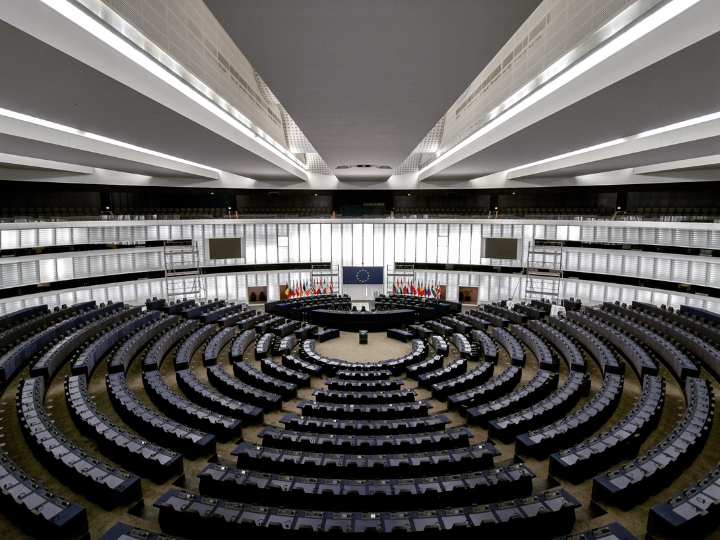by Sean Goulding Carroll
Climate NGOs and airlines have called on lawmakers to narrow the definition of sustainable aviation fuels (SAF) ahead of a European Parliament vote on Thursday (7 July).
MEPs in Strasbourg will vote today (7 July) on ReFuelEU Aviation, legislation that would oblige all aircraft refuelling in the EU to uplift a steadily increasing percentage of SAF.
The European Parliament’s transport committee amended the European Commission’s proposal by raising the percentage of green jet fuel that must be uplifted and broadening the list of approved feedstocks eligible for SAF production.
While the text was overwhelmingly approved in committee, Greens MEPs voted against the amendments, arguing that expanding the definition of SAFs would encourage the use of unsustainable biofuels feedstocks in the aviation sector.
Specific concerns were expressed over the inclusion of Palm Fatty Acid Distillate (PFAD), a by-product of the palm oil refining process; category 3 animal fats, which are typically used as pet food and for industrial purposes; and so-called “intermediate” crops, which are grown outside of the primary growing season.
Greens MEPs are encouraging colleagues to vote in favour of the original, more limited definition of SAF put forward by the European Commission.
“The broad coalition of political, environmental, and major industry interests in favour of keeping the Commission’s definition is testament to the deep unpopularity of burning unsustainable biofuels like palm oil to fuel our planes,” said Irish MEP Ciaran Cuffe.
Strange bedfellows
Transport and Environment (T&E), a clean mobility NGO, and airlines are both in favour of limiting the list of approved feedstocks – two groups more used to being on opposing sides of the decarbonisation debate.
In an unusual move, T&E and the budget airline easyJet sent a joint letter to MEPs this week, calling on them to reject amendments that would widen feedstock eligibility.
“A strict definition of sustainable aviation fuels is necessary to achieve the goals of the European Green Deal and to maintain the credibility of the aviation industry,” states the letter.
“SAFs are essential to the sector’s green recovery and the aviation industry will harm its long-term reputation with its customers and the general public by letting in harmful fuels,” the letter continues.
A4E, a trade association representing European airlines, said that it is “essential that passengers trust that the ramp up of sustainable fuels in the coming years will not occur at the expense of food supplies for people or animals, nor damage our environment”.
The airline association expressed concern that the compromise reached in the transport committee could “put further pressure on food/feed production and exacerbate deforestation”.
Considerable support
Despite concern from green NGOs and airlines, the amendments enjoyed considerable support in the transport committee, passing with 25 votes in favour to six against.
The committee text was backed by MEPs from three of the Parliament’s largest voting blocs: the centre-right EPP, the centrist Renew, and the centre-left S&D Group.
Claudia Monteiro de Aguiar, a Portuguese lawmaker with the EPP group, told EURACTIV that a broad definition of SAFs will bring Europe more in line with global standards, such as those set at UN level by the International Civil Aviation Organisation (ICAO). It will also help to achieve “ambitious decarbonisation targets” in a “more cost-effective manner”, she said.
The European Waste-based & Advanced Biofuels Association (EWABA), an industry trade association, sees the transport committee amendments as “fundamental” to achieving the objectives of the regulation “without triggering unintended negative consequences”.
If a stricter feedstock base is agreed, short-term demand for SAFs will be met almost exclusively with used cooking oil and animal fats, both of which are already employed to decarbonise the road transport and maritime sectors, according to Angel Alberdi, EWABA secretary-general.
“If these feedstocks are diverted to aviation, the ReFuelEU aviation proposal will actually increase EU net emissions and force the closure of different waste-based biodiesel plants across EU Member States because of lack of feedstock to process,” said Alberdi.
Both the EU’s renewable energy directive and the FuelEU maritime proposal include broader feedstock eligibility, Alberdi remarked. “If a feedstock is sustainable for the purposes of REDII and FuelEU maritime compliance, why should it be excluded from the SAF definition?” he asked.
The broadening of the feedstock base can be fine-tuned during negotiations between the Parliament and Council, ensuring the final text of the regulation is acceptable to MEPs with concerns, Alberdi added.
*first published in: www.euractiv.com




 By: N. Peter Kramer
By: N. Peter Kramer
